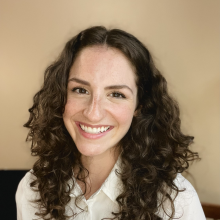

The School Psychology Ph.D. program is a research-intensive program designed to prepare you for a range of careers in academia, research, and clinical practice. Emphasizing a scientist-practitioner orientation, this program combines rigorous coursework, collaborative research and hands-on clinical experience. An ideal candidate is passionate about advancing psychological science, committed to providing evidence-based services, and eager to contribute to the well-being of diverse student populations. Through this program, you will develop a deep understanding of psychological theories, research methodologies and clinical practices. With the support of our dedicated faculty, you will learn to address mental health, academic and social challenges in educational settings. This knowledge is crucial for promoting healthy development, enhancing educational outcomes, and advocating for effective policies and practices in schools.
Key Features
- Scientist-Practitioner: Combines foundational scientific knowledge with clinical practice, emphasizing research and evidence-based interventions.
- Licensure and Certification: Graduates are eligible for licensure as professional psychologists and for the NCSP credential, with eligibility for MSDE certification as School Psychologists.
- Interdisciplinary Collaboration: Connect with faculty and students across various departments and institutions, enhancing research and professional development opportunities.
- Comprehensive Training: Includes coursework, research, fieldwork, internships, and professional development seminars.
Our program has the following accreditations:
- American Psychological Association (APA) (next site visit scheduled for 2028)
- National Association of School Psychologists (NASP) (next review scheduled for 2030)
The training program is housed within the College of Education, which is accredited by the National Council for the Accreditation of Teacher Education (NCATE).
All of the College of Education’s school professional preparation programs are approved by the Maryland State Department of Education (MSDE).
This program’s goals and objectives fall into three areas: scientific knowledge, clinical practice and research.
Goal: Students will develop foundational knowledge and become well-versed in profession-wide competencies via the required course sequence.
Objectives:
- Students will be well-versed in foundational scientific knowledge including: (a) history and systems of psychology; (b) affective, biological, cognitive and social aspects of behavior; and (c) research methods, statistical analysis and psychometrics.
- Students will gain knowledge regarding professional competencies including (a) research; (b) ethical/legal standards; (c) individual and cultural diversity; (d) professional values and attitudes; (e) communication/interpersonal skills; (f) assessment; (g) intervention; (h) supervision; and (i) consultation.
Goal: Students will demonstrate entry-level competence, provide evidence-based school psychological services, and develop identities as professional psychologists.
- Students will demonstrate entry-level competence as specified by the American Psychological Association with respect to “discipline-specific knowledge, profession-wide competencies and learning/curriculum elements required by the profession.”
- Students will be able to provide evidence-based school psychological services in the context of a multicultural, pluralistic society such that inter-individual differences and differences in culture, ethnicity, gender, socioeconomic status and sexual orientation are understood and respected.
- Students will develop identities as professional psychologists specializing in school psychology, and practice in accord with professional practice standards and a scientific knowledge base.
Objectives:
- Students will demonstrate knowledge of theory and research pertinent to mental health service delivery in regard to: (a) psychodiagnostic, psychoeducational, and educational assessment, (b) interventions to address academic and social behavior issues, and (c) individual and group counseling of school-age students; and will demonstrate the ability to apply their knowledge in the foregoing areas to the solution of identified client problems.
- Students will demonstrate knowledge of theory and research in regard to: (a) case- and consultee-centered consultation, (b) team-based support systems, and (c) systems-level consultation; and will demonstrate the ability to apply their knowledge in the foregoing areas to the solution of identified client or systems-level problems.
- Students will demonstrate knowledge of inter-individual differences (e.g., temperament, learning abilities, personality attributes, disability status) and knowledge of the influences of social, cultural, ethnic, experiential, socioeconomic, gender-related, and linguistic factors on students’ development and learning.
- Students will apply knowledge of such differences in their assessment, consultation, counseling and other professional work in order to ensure effective, equitable, and respectful school psychological services to all of their clients and other service recipients.
- Students demonstrate knowledge of the historical development of psychology and of school psychology in the context of current developments in the discipline.
- Students will demonstrate professional identities as psychologists through their membership and participation in professional and scientific organizations, and through their expressed research and professional goals.
- Students will demonstrate knowledge of, and adherence to, ethical and legal guidelines in all aspects of their professional work.
Goal: Students will understand, generate, and disseminate research in order to contribute to the scientific knowledge base.
Objectives:
- Students will have an ongoing involvement in all stages of the research process with increasing independence over time.
- Students will engage in conducting original research and disseminating psychological science via completion of the master’s thesis, doctoral dissertation, and comprehensive requirements.
Research Labs:
- Emotions, Equity, & Education Lab (Dr. Colleen O'Neal)
- Temperament & Narratives Lab (Dr. Hedy Teglasi)
- Bullying Prevention and Mental Health Promotion Lab (Dr. Cixin Wang)
- Risk, Resilience, and Culture Lab (Dr. Chunyan Yang)
Join SASP
Student Affiliates of School Psychologists (SASP) is a student-run organization that fosters growth and professionalism among the students in the School Psychology program at the University of Maryland. SASP facilitates an awareness and understanding in the school psychology profession by providing support and developmental opportunities.
Information on admissions and application to this program can be found on the university's Graduate Admissions website.
In addition to the Graduate School requirements, this program has the following:
- Letters of Recommendation (3)
- CV/Resume
- Supplementary Application
- Description of Research/Work Experience
- Writing Sample
**Graduate Record Examination (GRE) scores are not considered as a criterion for admission into the program.
Students entering this program are expected to have an adequate knowledge base in psychology, typically mastered through undergraduate coursework.
Although a psychology major is not necessary, the admissions committee must be satisfied that the applicant’s background knowledge is sufficient in the following areas: developmental psychology or child development, human learning, biological bases of behavior, and statistics. Additional areas may include: social psychology, cognitive psychology, and personality psychology. It is preferred that at least one course includes a laboratory component. A newly admitted student who is lacking adequate background may be required to complete prerequisites during the first year of the program.
The admissions committee considers the overall strength of the application, based on the following information:
- Undergraduate GPA
- Previous graduate GPA, if applicable
- Graduate Record Exam (Verbal, Quantitative, and Writing)
- Applicant's goals and objectives in relation to those of the program
- Undergraduate and/or graduate major–or demonstration of competence in the content areas listed below as prerequisites
- Letters of reference.
Applicants are selected on a competitive basis from those meeting minimum requirements. The program typically accepts around 20% of new applicants, depending on the size and characteristics of the applicant pool, and on available resources. These parameters can vary from year to year. Undergraduate GPA's of accepted students typically range from about 3.3 to 4.0 with the last three years averaging 3.72. Psychology is the predominant undergraduate major of accepted applicants.
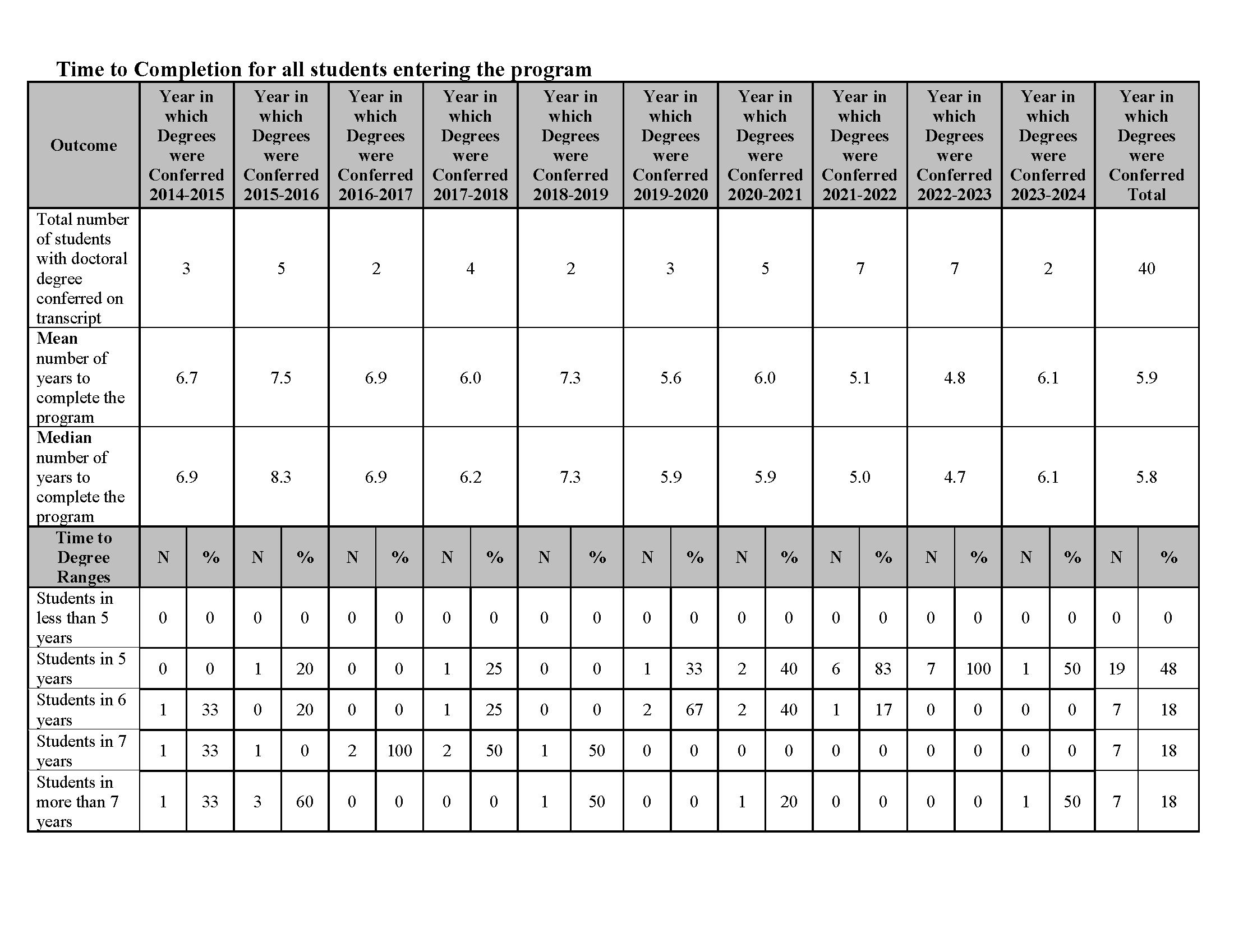
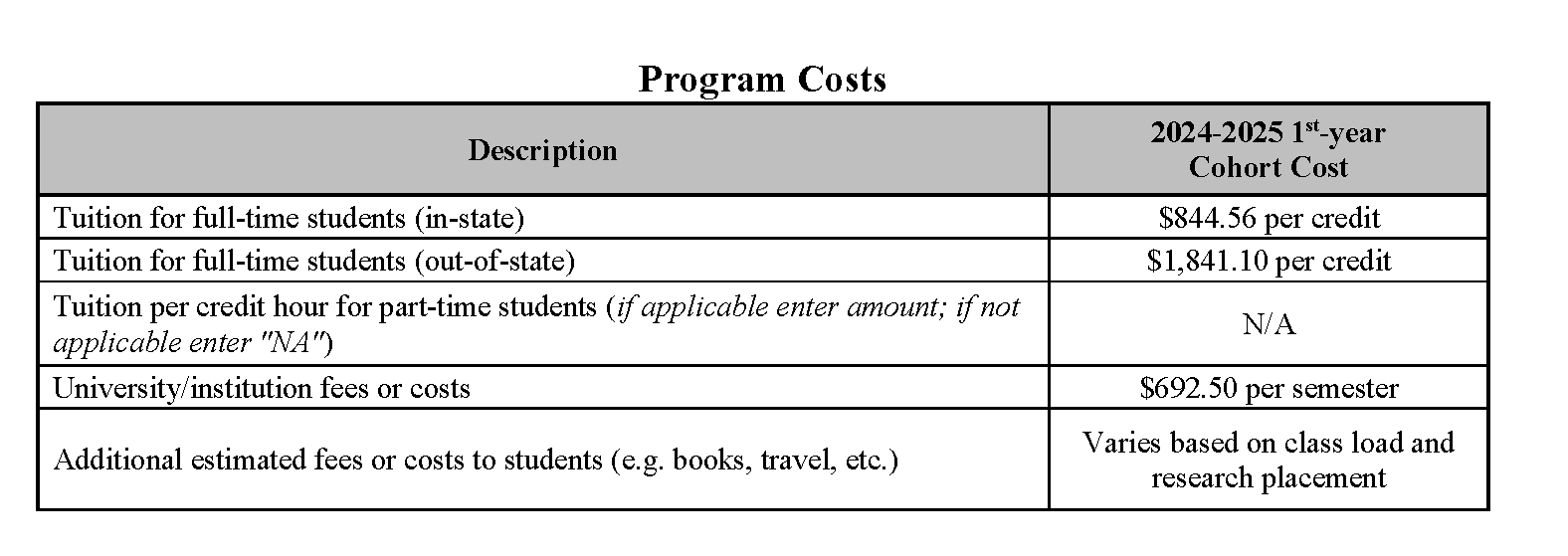
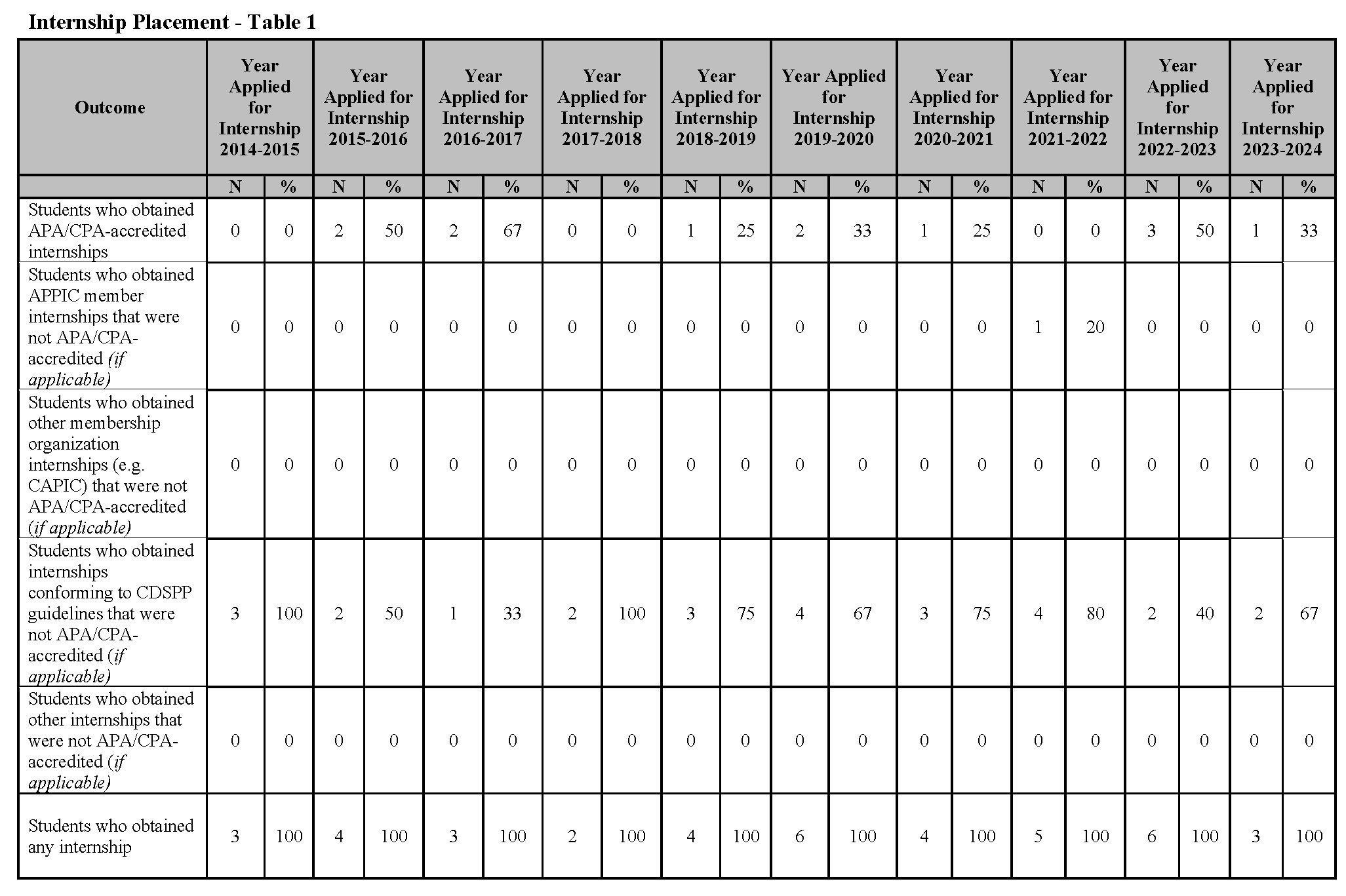
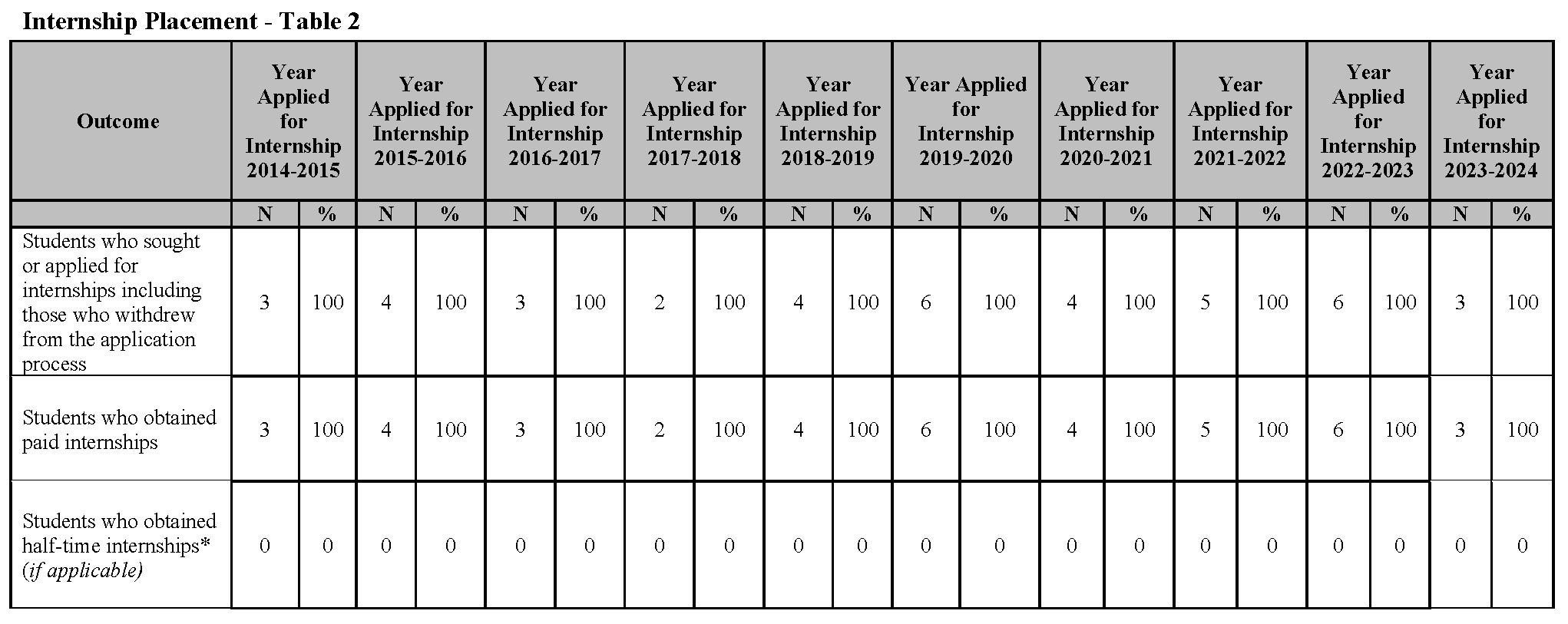
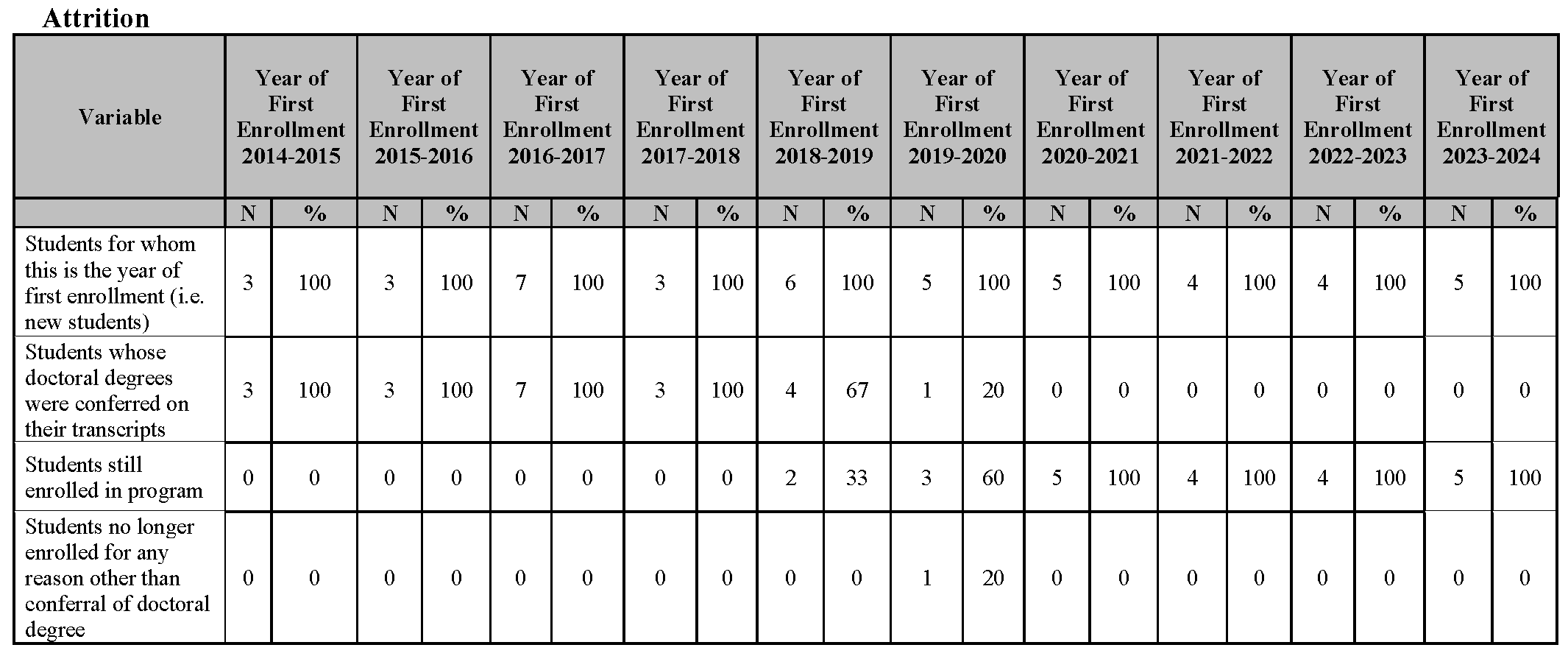

The program is designed to integrate rigorous coursework, comprehensive fieldwork, and advanced research components, ensuring you have a strong foundation and advanced skills upon graduation.
For full details on curriculum and program requirements, view the handbook and manual.
Program of Study
The curriculum requirements are designed to ensure adequate preparation in reference to the program's goals. A total of 74 coursework credits are required, with an additional 21-27 credits being required for research and fieldwork/internship. The program typically requires four years of full-time, resident graduate study in coursework and fieldwork prior to the year-long pre-doctoral internship. Students are required to have an approved dissertation proposal prior to beginning an internship. The Program Handbook includes a detailed listing of course requirements. Those entering the program with advanced degrees may have some requirements waived based on previous graduate work, as described in the Program Handbook.
The School Psychology Program provides a sequence of experiential coursework and field placements starting in the first year with pre-practicum laboratory experiences, practicum, fieldwork, and the pre-doctoral internship. Lab experiences and practicum courses have on- and off-campus components. Post-practicum fieldwork typically occurs during the fourth year and internship during the fifth year. Practicum experiences are closely supervised and directed by program faculty. Post-practicum fieldwork and the pre-doctoral internship allow for a greater degree of independent functioning by the student under field-based supervision, with oversight by the program faculty.
Typically completed during a student’s fourth year, fieldwork experiences call for an assignment of 10 hours per week gaining experience in school psychology science and practice in an education-related setting, with field-based supervision and support by a faculty member. Students may choose a variety of activities, based on their interests. For example, a student may work in assessment or consultation in a school or school system; conduct program evaluations for school, school system, or educational agency programs; engage in consultation or research for a school system; or engage in an administrative or advocacy role in a school psychology-related organization.
A paid, pre-doctoral internship equivalent in length to full-time work for either one K-12 school year or one calendar year, totaling at least 1750 hours, is required after the completion of all coursework. The internship must be completed in no longer than a 24 month period. Internships must either be APA-accredited or conform to the CDSPP Internship Guidelines. Pre-doctoral internships are either: (a) a full-year, school-based internship, or (b) a full-year internship in a consortium arrangement in which at least half is in a school setting.
Alternative internship placements are available for students who either: (a) have previously completed a 1200-hour specialist-level school psychology internship, or (b) whose combination of previous internship and work experience as a school psychologist are judged to be equivalent to the required specialist-level internship. Specific requirements for the internship, and policies and procedures pertaining thereto, are detailed in the Program Handbook.
Research involvement is an integral part of the School Psychology Program. Accordingly, students become involved in research activities during their first semester, and continue their involvement continuously prior to their internship year. Students are required to make at least one presentation at a national conference and to submit at least one manuscript for publication prior to earning their Ph.D.
The master's thesis is the culminating requirement for the master’s degree. All students must complete a formal master's thesis in order to earn the M.A.
Doctoral students entering with a master's degree who have not completed an acceptable research project must demonstrate research competency in lieu of doing a master's thesis. This research competency project must be completed and approved by the Program prior to advancement to doctoral candidacy. The Program Handbook includes criteria for evaluating students’ previous research work.
The doctoral dissertation is a major research project designed to both demonstrate the student's research competence and to make a substantive contribution to the research literature. An approved dissertation proposal is due prior to beginning the pre-doctoral internship.
Our program has four core full-time members responsible for administering the program, but other faculty members from the Department, College and University teach courses and serve on thesis and dissertation committees for our students.
Core faculty members typically supervise research and practicum experiences as well as teach.
Emeritus faculty includes those who have been long-standing core members of the school psychology faculty, but who are now retired. They may continue to advise students who began their work with them, continue an active program of research and scholarship, and serve on thesis and dissertation committees, but they do not accept new advisees.


